AWM41 1019 - [Nurses Narratives] Sister J O'Dwyer - Part 2
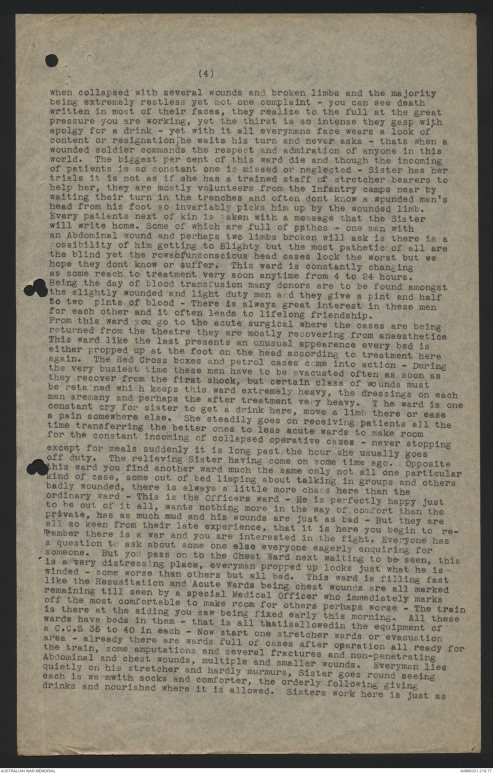
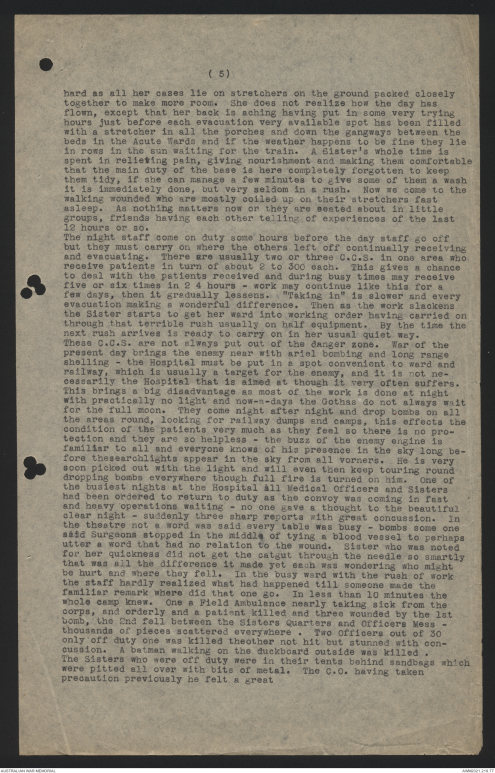
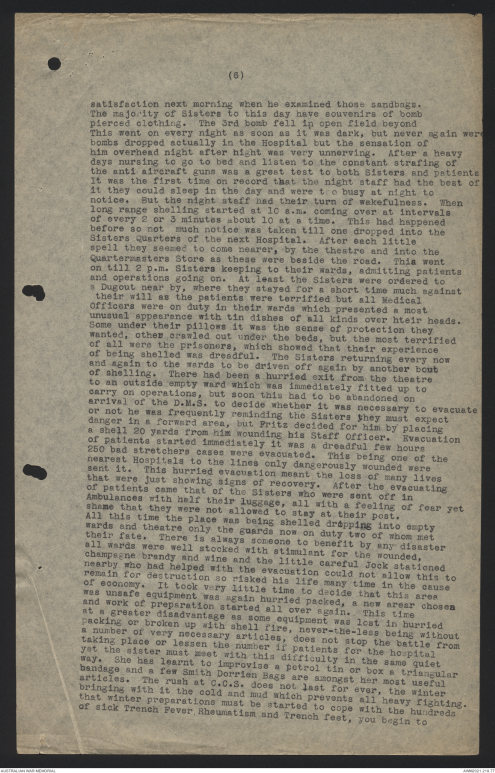
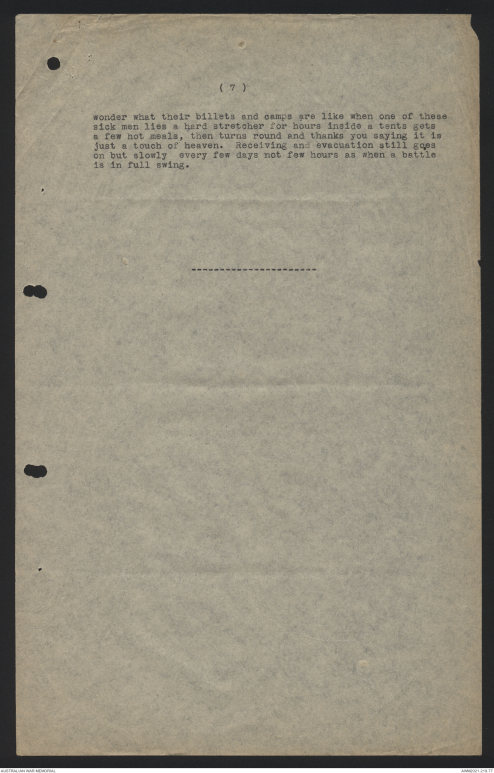
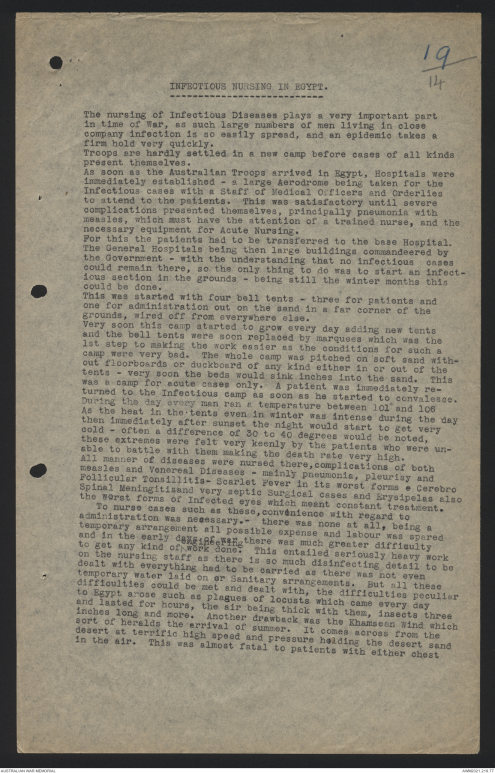
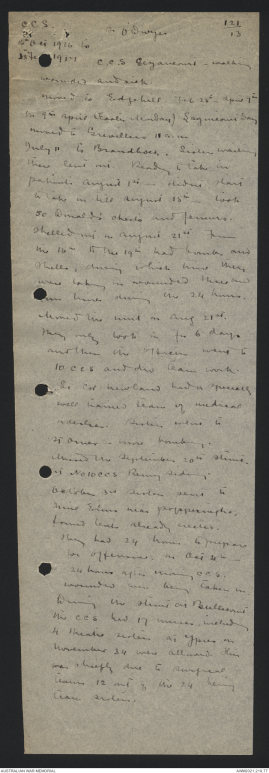
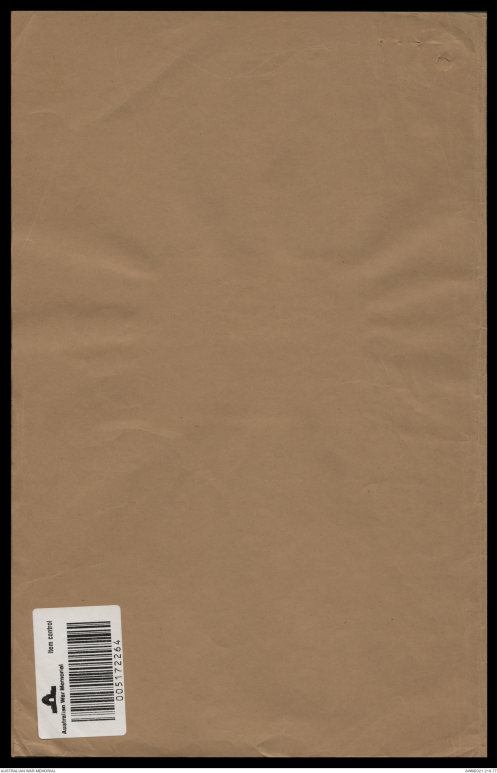
(4)
when collapsed with several wounds and broken limbs and the majority
being extremely restless yet not one complaint - you can see death
written in most of their faces, they realize to the full at the great
pressure you are working, yet the thirst is so intense they gasp with
apolgy for a drink - yet with it all everymans face wears a look of
content or resignation; he waits his turn and never asks - thats when a
wounded soldier commands the respect and admiration of anyone in this
world. The biggest per cent of this ward die and though the incoming
of patients is so constant one is missed or neglected - Sister has her
trials it is not as if she has a trained staff of stretcher bearers to
help her, they are mostly volunteers from the Infantry camps near by
waiting their turn in the trenches and often dont know a wounded man's
head from his foot so invariably picks him up by the wounded limb.
Every patients next of kin is taken with a message that the Sister
will write home. Some of which are full of pathos - one man with
an Abdominal wound and perhaps two limbs broken will ask is there is a
possibility of him getting to Blighty but the most pathetic of all are
the blind yet the rows of unconscious head cases look the worst but we
hope they dont know or suffer. This ward is constantly changing
as some reach to treatment very soon anytime from 4 to 24 hours.
Being the day of blood transfusion many donors are to be found amongst
the slightly wounded and light duty men and they give a pint and half
to two pints of blood - There is always great interest in these men
for each other and it often leads to lifelong friendship.
From this ward you go to the acute surgical where the cases are being
returned from the theatre they are mostly recovering from anaesthetice
This ward like the last presents an unusual appearance every bed is
either propped up at the foot on the head according to treatment here
again. The Red Cross boxes and petrol cases come into action - During
the very busiest time these men have to be evacuated often as soon as
they recover from the first shock, but certain class of wounds must
be retained which keeps this ward extremely heavy, the dressings on each
man are many and perhaps the after treatment very heavy. The ward is one
constant cry for sister to get a drink here, move a limb there or ease
a pain somewhere else. She steadily goes on receiving patients all the
time transferring the better ones to less acute wards to make room
for the constant incoming of collapsed operative cases - never stopping
except for meals suddenly it is long past the hour she usually goes
off duty. The relieving Sister having come on some time ago. Opposite
this ward you find another ward much the same only not all one particular
kind of case, some out of bed limping about talking in groups and others
badly wounded, there is always a little more chaos here than the
ordinary ward - This is the Officers ward - He is perfectly happy just
to be out of it all, wants nothing more in the way of comfort than the
private, has as much mud and his wounds are just as bad - But they are
all so keen from their late experience, that it is here you begin to remember
there is a war and you are interested in the fight. Everyone has
a question to ask about some one else everyone eagerly enquiring for
someone. But you pass on to the Chest Ward next waiting to be seen, this
is a very distressing place, everyman propped up looks just what he is
winded - some worse than others but all bad. This ward is filling fast
like the Resusitation and Acute Wards being chest wounds are all marked
remaining till seen by a special Medical Officer who immediately marks
off the most comfortable to make room for others perhaps worse - The train
is there at the siding you saw being fixed early this morning. All these
wards have beds in them - that is all that is allowed in the equipment of
a C.C.S. 36 to 40 in each - Now start one stretcher wards or evacuation
area - already there are wards full of cases after operation all ready for
the train, some amputations and several fractures and non-penetrating
Abdominal and chest wounds, multiple and smaller wounds. Everyman lies
quietly on his stretcher and hardly murmurs, Sister goes round seeing
each is warm with socks and comforter, the orderly following giving
drinks and nourished where it is allowed. Sisters work here is just as
(5)
hard as all her cases lie on stretchers on the ground packed closely
together to make more room. She does not realize how the day has
flown, except that her back is aching having put in some very trying
hours just before each evacuation very available spot has been filled
with a stretcher in all the porches and down the gangways between the
beds in the Acute Wards and if the weather happens to be fine they lie
in rows in the sun waiting for the train. A Sister's whole time is
spent in relieving pain, giving nourishment and making them comfortable
that the main duty of the base is here completely forgotten to keep
them tidy, if she can manage a few minutes to give some of them a wash
it is immediately done, but very seldom in a rush. Now we come to the
walking wounded who are mostly coiled up on their stretchers fast
asleep. As nothing matters now or they are seated about in little
groups, friends having each other telling of experiences of the last
12 hours or so.
The night staff come on duty some hours before the day staff go off
but they must carry on where the others left off continually receiving
and evacuating. There are usually two or three C.C.S. in one area who
receive patients in turn of about 2 to 300 each. This gives a chance
to deal with the patients received and during busy times may receive
five or six times in 24 hours - work may continue like this for a
few days, then it gradually lessens. "Taking in" is slower and every
evacuation making a wonderful difference. Then as the work slackens
the Sister starts to get her ward into working order having carried on
through that terrible rush usually on half equipment. By the time the
next rush arrives is ready to carry on in her usual quiet way.
These C.C.S. are not always put out of the danger zone. War of the
present day brings the enemy near with ariel bombing and long range
shelling - the Hospital must be put in a spot convenient to ward and
railway, which is usually a target for the enemy, and it is not necessarily
the Hospital that is aimed at though it very often suffers.
This brings a big disadvantage as most of the work is done at night
with practically no light and now-a-days the Gothas do not always wait
for the full moon. They come night after night and drop bombs on all
the areas round, looking for railway dumps and camps, this effects the
condition of the patients very much as they feel so there is no protection
and they are so helpless - the buzz of the enemy engine is
familiar to all and everyone knows of his presence in the sky long before
the searchlights appear in the sky from all vorners. He is very
soon picked out with the light and will even then keep touring round
dropping bombs everywhere though full fire is turned on him. One of
the busiest nights at the Hospital all Medical Officer and Sisters
had been ordered to return to duty as the convoy was coming in fast
and heavy operations waiting - no one gave a thought to the beautiful
clear night - suddenly three sharp reports with great concussion. In
the theatre not a word was said every table was busy - bombs some one
said Surgeons stopped in the middle of tying a blood vessel to perhaps
utter a word that had no relation to the wound. Sister who was noted
for her quickness did not get the catgut through the needle so smartly
that was all the difference it made yet each was wondering who might
be hurt and where they fell. In the busy ward with the rush of work
the staff hardly realized what had happened till someone made the
familiar remark where did that one go. In less than 10 minutes the
whole camp knew. One a Field Ambulance nearly taking sick from the
corps, and orderly and a patient killed and three wounded by the 1st
bomb, the 2nd fell between the Sisters Quarters and Officers Mess -
thousands of pieces scattered everywhere. Two Officers out of 30
only off duty one was killed the other not hit but stunned with concussion.
A batman walking on the duckboard outside was killed.
The Sisters who were off duty were in their tents behind sandbags which
were pitted all over with bits of metal. The C.C. having taken
precaution previously he felt a great
(6)
satisfaction next morning when he examined those sandbags.
The majority of Sisters to this day have souvenirs of bomb
pierced clothing. The 3rd bomb fell in open field beyond
This went on every night as soon as it was dark, but never again were
bombs dropped actually in the Hospital but the sensation of
him overhead night after night was very unnerving. After a heavy
days nursing to go to bed and listen to the constant strafing of
the anti aircraft guns was a great test to both Sisters and patients
It was the first time on record that the night staff had the best of
it they could sleep in the day and were too busy at night to
notice. But the night staff had their turn of wakefulness. When
long range shelling started at 10 a.m. coming over at intervals
of every 2 or 3 minutes about 10 at a time. This had happened
before so not much notice was taken till one dropped into the
Sisters Quarters of the next Hospital. After each little
spell they seemed to come nearer, by the theatre and into the
Quartermasters Store as these were beside the road. This went
on till 2 p.m. Sisters keeping to their wards, admitting patients
and operations going on. At least the Sisters were ordered to
a Dugout near by, where they stayed for a short time much against
their will as the patients were terrified but all Medical
Officers were on duty in their wards which presented a most
unusual appearance with tin dishes of all kinds over hteir heads.
Some under their pillows it was the sense of protection they
wanted, others crawled out under the beds, but the most terrified
of all were the prisoners, which showed that their experience
of being shelled was dreadful. The Sisters returning every now
and again to the wards to be driven off again by another bout
of shelling. There had been a hurried exit from the theatre
to an outside empty ward which was immediately fitted up to
carry on operations, but soon this had to be abandoned on
arrival of the D.M.S. to decide whether it was necessary to evacuate
or not he was frequently reminding the Sisters they must expect
danger in a forward area, but Fritz decided for him by placing
a shell 20 yards from him wounding his Staff Officer. Evacuation
of patients started immediately it was a dreadful few hours
250 bad stretchers cases were evacuated. This being one of the
nearest Hospitals to the lines only dangerously wounded were
sent it. This hurried evacuation meant the loss of many lives
that were just showing signs of recovery. After the evacuating
of patients came that of the Sisters who were sent off in
Ambulances with half their luggage, all with a feeling of fear yet
shame that they were not allowed to stay at their post.
All this time the place was being shelled dropping into empty
wards and theatre only the guards now on duty two of whom met
their fate. There is always someone to benefit by any disaster
all wards were well stocked with stimulant for the wounded,
champagne brandy and wine and the little careful Jock stationed
nearby who had helped with the evacuation could not allow this to
remain for destruction so risked his life many times in the cause
of economy. It took very little time to decide that this area
was unsafe equipment was again hurried packed, a new arear chosen
and work of preparation started all over again. This time
at a greater disadvantage as some equipment was lost in hurried
packing or broken up with shell fire, never-the-less being without
a number of very necessary articles, does not stop the battle from
taking place or lessen the number if patients for the hospital
yet the sister must meet with this difficulty in the same quiet
way. She has learnt to improvise a petrol tin or box a triangular
bandage and a few Smith Dorrien Bags are amongst her most useful
articles. The rush at C.C.S. does not last for ever, the winter
bringing with it the cold and mud which prevents all heavy fighting.
that winter preparations must be started to cope with the hundreds
of sick Trench Fever Rheumatism and Trench feet, you begin to
(7)
wonder what their billets and camps are like when one of these
sick men lies a hard stretcher for hours inside a tents gets
a few hot meals, then turns round and thanks you saying it is
just a touch of heaven. Receiving and evacuation still goes
on but slowly every few days not few hours as when a battle
is in full swing.
19/14
INFECTIOUS NURSING IN EGYPT.
The nursing of Infectious Diseases plays a very important part
in time of War, as such large numbers of men living in close
company infection is so easily spread, and an epidemic takes a
firm hold very quickly.
Troops are hardly settled in a new camp before cases of all kinds
present themselves.
As soon as the Australian Troops arrived in Egypt, Hospitals were
immediately established - a large Aerodrome being taken for the
Infectious cases with a Staff of Medical Officers and Orderlies
to attend to the patients. This was satisfactory until severe
complications presented themselves, principally pneumonia with
measles, which must have the attention of a trained nurse, and the
necessary equipment for Acute Nursing.
For this the patients had to be transferred to the base Hospital.
The General Hospitals being then large buildings commandeered by
the Government - with the understanding that no infectious cases
could remain there, so the only thing to do was to start an infectious
section in the grounds - being still the winter months this
could be done.
This was started with four bell tents - three for patients and
one for administration out on the sand in a far corner of the
grounds, wired off from everywhere else.
Very soon this camp started to grow every day adding new tents
and the bell tents were soon replaced by marquees which was the
1st step to making the work easier as the conditions for such a
camp were very bad. The whole camp was pitched on soft sand without
floorboards or duckboard of any kind either in or out of the
tents - very soon the beds would sink inches into the sand. This
was a camp for acute cases only. A patient was immediately returned
to the Infectious camp as soon as he started to convalesce.
During the day every man ran a temperature between 101° and 106
As the heat in the tents even in winter was intense during the day
then immediately after sunset the night would start to get very
cold - often a difference of 30 to 40 degrees would be noted,
these extremes were felt very keenly by the patients who were unable
to battle with them making the death rate very high.
All manner of diseases were nursed there, complications of both
measles and Venereal Diseases - mainly pneumonia, pleurisy and
Follicular Tonsillitis - Scarlet Fever in its worst forms - Cerebro
Spinal Meningitis and very septic Surgical cases and Erysipelas also
the worst forms of Infected eyes which meant constant treatment.
To nurse cases such as these, convenience with regard to
administration was necessary.- there was none at all, being a
temporary arrangement all possible expense and labour was spared
and in the early days of war there was much greater difficulty
to get any kind of ^engineering work done. This entailed seriously heavy work
on the nursing staff as there is so much disinfecting detail to be
dealt with everything had to be carried as there was not even
temporary water laid on or Sanitary arrangements. But all these
difficulties could be met and dealt with, the difficulties peculiar
to Egypt arose such as plagues of locusts which came every day
and lasted for hours, the air being thick with them, insects three
inches long and more. Another drawback was the Khamsean wind which
sort of heralds the arrival of summer. It comes across from the
desert at terrific high speed and pressure holding the desert sand
in the air. This was almost fatal to patients with either chest
CCS.
3
16 Oct 1916 to
5 Feb 1917
Sr O'Dwyer
121/13
C.C.S Gezancourt - walking
wounded and sick.
Moved to Edgehill Feb 28th - April 7th
On 9th April (Easter Monday) Lagincourt Day
moved to Grevillers 11 am
July 11 to Brandhoek. Sisters waiting
there lent out. Ready to take in
patients August 1st - didnt start
to take in till August 15th - took
50 Donald's chests and femurs.
Shelled out on August 21st From
the 16th to the 19th had bombs and
shells, during which time they
were taking in wounded three and
four times during the 24 hours.
Moved the unit on Aug 21st.
They only took in for 6 days
and then the Officers went to
10 CCS and did team work.
Lt Col Newland had a specially
well trained team of medical
orderlies. Sisters went to
St Omer - more bombing
Missed the September 20th stunt.
at No 10 CCS Remy Siding
October 3rd Sisters sent to
Nine Elms near Popperinghe,
found tents already erected.
They had 24 hours to prepare
for offensive on Oct 4th -
24 hours after moving CCS
wounded men being taken in.
During the stunt at Bullecourt
the CCS had 17 nurses including
4 theatre sisters at Ypres in
November 34 were allowed. This
was chiefly due to surgical
teams 12 out of the 24 being
team sisters.
Australian War Memorial
Item control
005172264
 Sam scott
Sam scottThis transcription item is now locked to you for editing. To release the lock either Save your changes or Cancel.
This lock will be automatically released after 60 minutes of inactivity.